 THE ATLANTIC PHILANTHROPIES, IRELAND
THE ATLANTIC PHILANTHROPIES, IRELAND
Civil partnership for same-sex couples
Until 1994, Irish law still criminalized homosexual conduct. When The Atlantic Philanthropies entered the lesbian, gay, bisexual and transgender (LGBT) field in 2004, there were no other significant private funders in the area and only one full-time person in Ireland working on national strategy. (Image: Irish Independent)
The grants
Following research and consultation, Atlantic concluded that sustainable social change in this area could be achieved through a multi-annual grants programme aimed at building capacity. In September 2004, Atlantic provided a short-term grant to support a small national policy organization, the Gay and Lesbian Equality Network (GLEN), to secure the necessary capacity to develop its strategic plan. This was followed in 2005 by a five-year core grant. These grants gave GLEN the financial means and security to attract and retain seven highly qualified staff. These, in turn, helped GLEN implement its approach of principled ‘pragmatism’. It set out to achieve legislative change by consolidating its support, winning over the middle ground and neutralizing opposition. GLEN assiduously developed an extensive network of relationships at government and political levels and came to be regarded as both a source of expertise on legal recognition and a ‘trusted’ partner in the sense that it understood the constraints and choices facing government officials and politicians.
Results
In 2010, legislation was passed allowing same-sex couples in Ireland to enter a civil partnership, which carries an extensive range of marriage-like rights and obligations. What’s more, the law was passed with near unanimous support by a coalition government led by a conservative political party in a largely Catholic country. The legislation has also laid the ground for rapid progress towards civil marriage, with all Ireland’s political parties making public moves in that direction. (Pictured: Michael Murphy (left) and Terry O’Sullivan celebrate their civil partnership.)
Key facts
Capacity-building grant, September 2004: €266,000
Five-year core grant: €2,100,000 from January 2006
For more information
http://www.atlanticphilanthropies.org/achieving-civil-partnerships-same-sex-couples
http://www.glen.ie
FONDATION ENSEMBLE, FRANCE
Passive solar habitat in Indian Himalayas
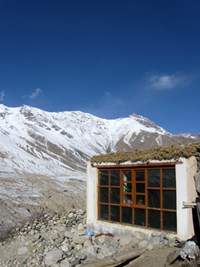 In the high Himalayas, living conditions are harsh. Night-time temperatures often fall to below minus 5°C (23°F) indoors and keeping smoky stoves lit is bad for the health. However, the Himalayas get an exceptional amount of sunshine, which provided the basis for a project proposed to Fondation Ensemble by the French international NGO Geres, which has been engaged in promoting clean and efficient energy production and consumption since 1979.
In the high Himalayas, living conditions are harsh. Night-time temperatures often fall to below minus 5°C (23°F) indoors and keeping smoky stoves lit is bad for the health. However, the Himalayas get an exceptional amount of sunshine, which provided the basis for a project proposed to Fondation Ensemble by the French international NGO Geres, which has been engaged in promoting clean and efficient energy production and consumption since 1979.
The grant
The grant of €250,000 over four years provided by Fondation Ensemble supported the building of passive solar houses. These introduced innovative, low-energy consumption technologies, making increased use of the region’s natural energy. Between 2008 and 2012, 1,000 passive solar houses and 34 collective buildings, made of local materials, were built in Jammu-Kashmir and Himachal Pradesh, India. This was a contribution to an EU project for which the total budget was €1,910 511. (Pictured: Passive solar house, Changthang, Ladakh.)
Results
Even though the project did not fully succeed in prompting the local authorities to introduce a real energy efficiency policy, it allowed transfer of technical skills and expertise, and local ownership increased. Each household saved as much as €50 annually. Fuel consumption, collection of biomass and pollution have been reduced. The houses are much warmer than previously: rather than falling to below minus 5°C (23° F) at night, the temperature never falls below 5°C (41°F), without using any heating devices. Since the project ended, its results have been shared with other Geres units and NGOs, so the lessons learned have been put to good use.
The grant had other benefits, too, like reinforcing the capacities of local people, particularly women who could meet and work together. As a result, 34 self-help women’s groups were created and 16 grassroots networks started.
Key facts
Grant: €250,000 over four years
Beneficiaries:
• 300,000 people living in Ladakh, Zanskar, Kargil, Lahaul and Spiti
• Local handicraft workers (masons, woodworkers, carpenters and traders)
• Partner NGOs, local and international
• Representatives of local communities
• Local and regional authorities
For more information
http://www.fondationensemble.org/fichestech/FT_Geres_habitat_GB.pdf
NEELAN TIRUCHELVAM TRUST, SRI LANKA
Addressing gender-based violence
Gender-based violence (GBV) is prevalent in Sri Lanka. However, because of non- implementation of existing legal safeguards, the inability of women to access remedies due to socio-cultural factors, and lack of support from the state, its institutions and service providers, women often do not seek help or redress.
The grant
NTT’s three-year grant, staring in 2011, supports the work of the GBV Desk, an independent unit at the Valaichenai Base Hospital in Batticaloa District in the Eastern Province. The Desk is staffed by a caseworker supported by a local NGO (Eastern Social Development Foundation). It provides referral services to victims of GBV to access appropriate means of non-medical assistance, and disseminates awareness on GBV and child abuse among the community. This support also enables the Desk to organize regular coordination meetings among various stakeholders including ministries, government officials, probation officers, the divisional secretariat, women’s development officers and police officers to ensure a collective and holistic response to GBV issues.
Results
The initiative has enabled victims of GBV and child abuse to access medical and psychological care and legal, emergency, education and economic assistance.
The increased number of reported GBV cases demonstrates heightened awareness among the community about the reporting mechanism. The ‘Incident Reporting Format’ designed by the Desk as part of the support provided by the grant was reviewed by the Family Health Bureau (FHB) and printed and distributed for use by other GBV desks in the country. The project has also created a strong GBV referral network system in the Batticaloa District. The Divisional Level Task Force led by the Divisional Secretariat (local authority) assumed responsibility for coordinating the network, thereby creating government ownership of the initiative.
Key facts
Grant: LKR4 million (US$30,600) over three years
Other support: NTT has helped the organization manage its projects, provided technical advice to introduce systematic data collection and built the capacity of staff.
For more information
http://www.neelan.org
DALIA ASSOCIATION, PALESTINE
The grant we never gave
 In Palestine, the problems of Israeli military occupation, colonization and exile are exacerbated by widespread dependence on a highly controlling international aid system. Small, unrestricted grants can be a perfect mechanism to engage communities in setting their own priorities and to strengthen civil society organizations’ accountability. Dalia Association’s community-controlled grantmaking mechanisms, ‘The Village Decides’ and ‘Women Supporting Women’, improve the credibility of local institutions, thus inspiring philanthropic investment from local people, the private sector and the diaspora, and decreasing dependence on international aid.
In Palestine, the problems of Israeli military occupation, colonization and exile are exacerbated by widespread dependence on a highly controlling international aid system. Small, unrestricted grants can be a perfect mechanism to engage communities in setting their own priorities and to strengthen civil society organizations’ accountability. Dalia Association’s community-controlled grantmaking mechanisms, ‘The Village Decides’ and ‘Women Supporting Women’, improve the credibility of local institutions, thus inspiring philanthropic investment from local people, the private sector and the diaspora, and decreasing dependence on international aid.
The grant … that wasn’t
In 2008 we got two off-the-street requests that – in trying to work out how to help – changed the way Dalia thinks about grantmaking. Wishah Popular Dance Troupe (pictured) in Ramallah asked for money for costumes for their Palestinian Dabkeh show. And another group, Akalil Troupe in Nablus, asked for money for their Palestinian Dabkeh costumes. We came up with the idea that, instead of raising money for two sets of costumes, the troupes, who had costumes from previous years that they could no longer use, could exchange costumes. In the end, Akalil was able to use Wishah’s costumes, and Wishah raised the money they needed, mostly from ticket sales.
Results
The impact on both was profound. Akalil saved money, and Wishah had the great satisfaction of giving.
Dalia Association was affected too. We realized that defining resources more broadly than money, and looking at what we have before we look at what we don’t have, has the power to lift us from dependence on international aid, reduce poverty dramatically, and transform the Palestinian community into one that is strong and dignified.
Many of our regular small grants have transformational impact. Though they usually range from only $1,000 to $4,000, they are decided democratically by the community in a transparent process facilitated by Dalia Association. This enables grantees to focus on local priorities and improve their local accountability. Now these grants come with a matching requirement. Grantees ‘earn’ the amount of their grant by putting up an equal amount of local resources, in cash, materials, services or time. This forces community groups to put a value on what they put in, and to recognize their own families, neighbours and local institutions as givers, not just receivers.
For more information
http://www.dalia.ps
THE GIFFORD FOUNDATION, USA
Micro-micro loans for community development
As a private foundation that prides itself on partnering with the community, we kept hearing of budding entrepreneurs who were ineligible for existing small business loans because they had no collateral and poor or no credit rating. So we approached Cooperative Federal Credit Union, a combination of traditional credit union and non-profit community development organization, about a revolving loan fund to provide ‘micro-micro’ loans, anything from $100 to $2,500.
The grant
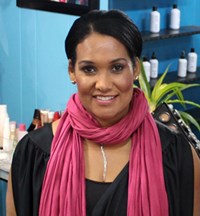 In 2011, we made a grant of $25,000 for loans dedicated to either entrepreneurial or job-readiness purposes for residents of Syracuse, a small post-industrial city 250 miles from New York. All participants were expected to complete financial literacy programmes. Since the fund was launched, Cooperative Federal has deployed 153 per cent of Gifford’s grant to 15 people, 87 per cent of whom are women and/or people of colour with poor or no credit scores. The rate of delinquency (late payments) is 0 per cent, and just two loans have defaulted. The rest of the loan capital continues to recycle – about 22 per cent of the seed capital has already been repaid in full. Adjusting for loan losses and loans to be paid, 32 per cent of the loan capital is available to be lent out once again to expand the growing pool of entrepreneurs.
In 2011, we made a grant of $25,000 for loans dedicated to either entrepreneurial or job-readiness purposes for residents of Syracuse, a small post-industrial city 250 miles from New York. All participants were expected to complete financial literacy programmes. Since the fund was launched, Cooperative Federal has deployed 153 per cent of Gifford’s grant to 15 people, 87 per cent of whom are women and/or people of colour with poor or no credit scores. The rate of delinquency (late payments) is 0 per cent, and just two loans have defaulted. The rest of the loan capital continues to recycle – about 22 per cent of the seed capital has already been repaid in full. Adjusting for loan losses and loans to be paid, 32 per cent of the loan capital is available to be lent out once again to expand the growing pool of entrepreneurs.
The results
The average loan size is just under $2,000, with the majority going towards entrepreneurial micro-businesses. A young woman, for example, had such good results from a TV advertising campaign for her dog grooming business that she needs a larger space for her growing staff. A struggling hair salon invested in a new line of retail beauty products (pictured: Belkis Espinal in her restocked All in One Hair Studio.) Job readiness loans were made for professional exam preparation courses, renewal of teaching certificates and purchase of professional clothing.
Cooperative Federal and Gifford regularly reflect on the grant progress and discuss lessons learned, which include tiered loan limits, modifying measurements of financial capacities and adding instalment loans. In addition, Cooperative Federal is now looking into post-loan support.
Each loan is a step towards a stronger economic outlook for the recipient, for the employees they hire and the tax base to which they contribute. Created in partnership with a non-profit after listening to the needs of the community, this grant exemplifies the Gifford Foundation’s belief that imaginative grantmaking, albeit with some risk, is the best route to social change.
Key facts
Grant: $25,000
Other support: Continuing monitoring which has led to modifications in the original initiative
For more information
http://www.giffordfoundation.org
URGENT ACTION FUND – AFRICA
Support women’s rights in Namibia
Mercy, a 20-year old Namibian woman, was admitted to a public hospital for an emergency surgery, unaware that she was pregnant. When she woke up from surgery, she was told by a nurse that they had ‘taken her womb because she had HIV’. She has no children and now it is unlikely she ever will. Her story is not unusual. Women’s rights organizations have documented the stories of dozens of HIV-positive women sterilized against their will in public hospitals.
In response, the women’s rights organization Women Solidarity Namibia sued the government for damages caused to 15 of its members who were allegedly sterilized by force. In the lawsuit, the women accused the government of failing to stop the unethical practice of sterilizing HIV-positive women and failing to create an environment in which their constitutional and basic human rights could be realized. Research conducted by the International Community of Women Living with AIDS shows that forced sterilization is part of a broader range of discriminations faced by HIV-positive women in sexual and reproductive health services. This is a particular concern in Namibia where approximately 2 million people, just over 15 per cent of the population, live with HIV.
The grant
In the wake of the furore created by the lawsuit, Urgent Action Fund-Africa provided a US$5,000 rapid-response grant to Women Solidarity Namibia – rapid-response grants are usually made within 48 hours of receiving a request. This allowed a coalition of like-minded organizations to seize the momentum created by the case to mount a national End Forced Sterilization campaign, raise awareness among affected women and implement sensitization workshops in several regions of Namibia, all within three months of receiving the grant. The strategy was to use the issue, which had gained fleeting national attention, to ensure better protection for HIV-positive women against forced sterilization and to enable affected women and their communities to be part of its prevention.
Key facts
Grant: $5,000
For more information
http://urgentactionfund-africa.or.ke
TUZLA COMMUNITY FOUNDATION, BOSNIA
From rubbish dump to sports field
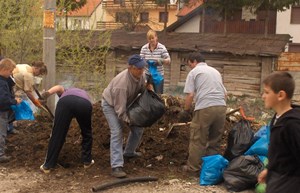 In 2006, the local community in Simin Han, a suburb of the Bosnian city of Tuzla, decided to take a more active role in their own affairs. With the help of Tuzla Community Foundation (TCF), 16 people planned their first action, cleaning up an unofficial rubbish dump in the area. With that first action came the realization that change is possible, that they could ‘take matters into their own hands’. This proved to be the first step in the development of an active community organization in Simin Han.
In 2006, the local community in Simin Han, a suburb of the Bosnian city of Tuzla, decided to take a more active role in their own affairs. With the help of Tuzla Community Foundation (TCF), 16 people planned their first action, cleaning up an unofficial rubbish dump in the area. With that first action came the realization that change is possible, that they could ‘take matters into their own hands’. This proved to be the first step in the development of an active community organization in Simin Han.
In 2013, a community needs assessment showed that the area had inadequate sport and recreation facilities. Active citizens held several community meetings where they planned and prepared a project named ‘All on the field’ to provide better amenities for sports and other activities for young people in Simin Han.
The grant
The site selected for the new sports field was in the very place where the community organization began, eight years ago, where the rubbish dump had been. Tuzla Community Foundation offered a challenge grant of €1,000 if €250 could be raised from local people. Fifty-six people pooled small donations from €1 to €25 to raise the amount needed. In three months, the project was successfully implemented.
Results
The community now has a sports field, thanks to its own initiative. Even more important than the creation of this piece of community infrastructure is the influence of the work on community spirit and the impetus it has given to the development of future plans and improvements. More than 40 local community members have been directly involved in the sports field in different ways. They have given over 400 volunteer hours, and raised funds. Among them are 20 young people, which bodes well for the future of this community. (Pictured: Simin Han community work in progress.)
Key facts
Challenge grant: €1,000
Other funding: €250 from local sources
For more information
http://www.fondacijatz.org
JOSEPH ROWNTREE CHARITABLE TRUST, UK
Highlighting the UK’s use of armed drones
In Afghanistan, Pakistan, Yemen, Somalia and Israel, wars are being fought with a new technology. Unmanned aerial vehicles – ‘drones’ – are becoming a weapon of choice for governments and military forces. The advocates of drones argue that the pilotless vehicles reduce the likelihood of unwanted casualties for both sides, enabling the drone operator to identify and strike military targets with a higher degree of precision. The critics highlight serious concerns regarding their impact on human rights, international law and the proliferation of violent conflict.
The grant
 In 2011, Chris Cole applied for funding to develop his work on the UK’s use of armed drones – JRCT encourages applicants to request support for work that fits within broad policy guidelines: control or elimination of particular forms of warfare, or promotion of non-violent responses to conflict. At the time, this issue attracted little public attention. The JRCT trustees met with Chris to discuss his plans. Impressed by his personal commitment and investigative research, they offered an initial grant over 18 months. This was followed by a further three-year grant to support the ongoing development of Chris’s organization, Drone Wars UK. (Pictured: hellfire missile fired from a USAF Reaper drone.)
In 2011, Chris Cole applied for funding to develop his work on the UK’s use of armed drones – JRCT encourages applicants to request support for work that fits within broad policy guidelines: control or elimination of particular forms of warfare, or promotion of non-violent responses to conflict. At the time, this issue attracted little public attention. The JRCT trustees met with Chris to discuss his plans. Impressed by his personal commitment and investigative research, they offered an initial grant over 18 months. This was followed by a further three-year grant to support the ongoing development of Chris’s organization, Drone Wars UK. (Pictured: hellfire missile fired from a USAF Reaper drone.)
Results
Since the initial grant in 2011, and despite reluctance on the part of the Ministry of Defence to reveal basic information, Chris has managed to uncover and release details of 40 per cent of UK drone strikes in Afghanistan, and to reveal for the first time that Afghan civilians have been killed by a UK drone strike. He has used his research to inform articles, interviews and speaking engagements. Along with a small number of other organizations, he has helped to awaken media, academic and public interest in the use of armed drones by the UK. The issue has moved from the fringes of the peace movement to the centre of debate about UK defence policy.
The work is not over. Drone Wars UK is a tiny organization and its attempts to access information from the Ministry of Defence are often blocked. But its efforts to shine a light on this highly secretive and controversial policy represent a vital contribution to our collective understanding of the violence perpetrated in other countries in our name.
Key facts
First grant: £24,000 over 18 months
Second grant: £90,000 over 3 years
Other support: Opportunities to participate in JRCT events, a skill-share workshop and a bursary scheme for training/development.
For more information
http://www.dronewars.net
WISE-PHILANTHROPY ADVISORS, SWITZERLAND
Educating young Brazilians
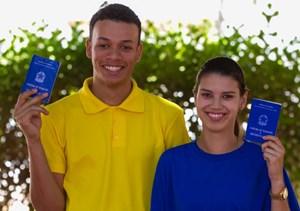 In her inaugural speech in 2010, Brazilian president Dilma Roussef said it was ‘essential’ that federal, state and municipal governments take ‘effective action’ in the field of education. Numbers speak for themselves: Brazil spends about US$2,960 per public school student compared to US$7,830 in Italy and US$12,800 in a state-funded school in Switzerland. Seventy-three per cent of Brazilians aged 13-17 do not complete high school, and teenagers form the majority of the 22 per cent of the population that lives below the poverty line. The lack of investment has a negative impact on the labour market. Companies are legally obliged to make some proportion of their positions available for vocational training, but a recent study shows that they have trouble finding young people with the necessary education to fill these slots.
In her inaugural speech in 2010, Brazilian president Dilma Roussef said it was ‘essential’ that federal, state and municipal governments take ‘effective action’ in the field of education. Numbers speak for themselves: Brazil spends about US$2,960 per public school student compared to US$7,830 in Italy and US$12,800 in a state-funded school in Switzerland. Seventy-three per cent of Brazilians aged 13-17 do not complete high school, and teenagers form the majority of the 22 per cent of the population that lives below the poverty line. The lack of investment has a negative impact on the labour market. Companies are legally obliged to make some proportion of their positions available for vocational training, but a recent study shows that they have trouble finding young people with the necessary education to fill these slots.
The grant
In 2009, a philanthropist advised by WISE provided a €250,000 donation to Foundation Pro Cerrado (FPC), a social enterprise in Goiana, to develop a model to remedy this lack. The challenge for WISE was to support the philanthropist and FPC in defining a strategy for a project whose results depended on a changing socioeconomic context. This is how the model works: a teenager is coached to complete high school and prepared for the vocational training of his/her choice. Once vocational school is completed, the teenager is ready to enter the workforce through an apprenticeship. Companies pay for the training process through RPA and ensure that the teenagers have the required skills to start the apprenticeship. This model was later replicated nationally through the Rede Pro Aprendiz (RPA) network. The project ended in 2012. (Pictured: Young apprentices with their formal contracts.)
Results
The RPA network, which currently includes 26 organizations and continues to expand, is 95 per cent self-financed thanks to the companies’ contributions. It has created 7,770 apprenticeship positions held by 12,998 unprivileged youth; 63 per cent of the apprentices are still employed in the company that trained them; the majority of the others have found another job or started their own micro-enterprise.
Key facts
Grant: €250,000
Other support: Advice and strategic support from WISE
For more information
http://www.wise.net/index_en.php http://www.fpc.org.br/website/index.php
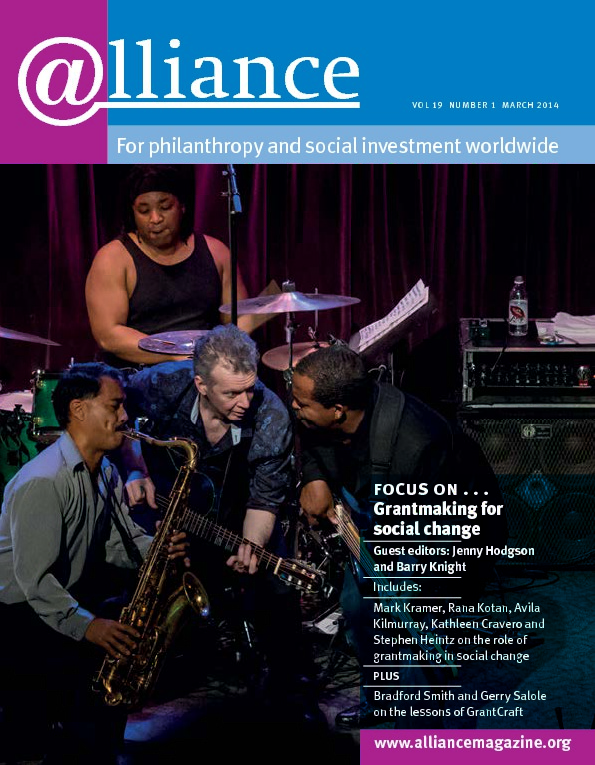


Comments (0)